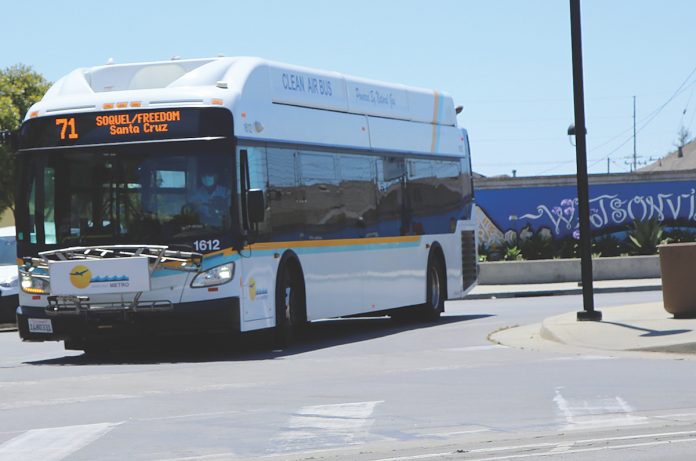
SANTA CRUZ COUNTY—The Santa Cruz Metropolitan Transit District (METRO) Board of Directors at its May 21 virtual meeting unanimously approved a contract extension with CEO and General Manager Alex Clifford that will keep him at the head of the transportation agency through May 6, 2025.
The decision came despite calls from two unions representing various METRO employees—including bus operators—for the board to part ways with Clifford because of “serious concerns” about his behavior as CEO, according to an email sent to the board on May 20 obtained by this publication.
More than 80% of local Sheet Metal Air Rail Transportation (SMART) and Service Employees International Union (SEIU) members said in a survey that they have “no confidence” in Clifford’s leadership, the email shows.
That vote reflects, the email states, Clifford’s unwillingness to work with the unions in various capacities. That includes failing to meet with union officers to ease tensions around Covid-19 safety precautions and possible layoffs, requiring that all METRO employees return to the office with “no flexibility for remote work whatsoever,” and entering into pricey arbitration with employees, according to documents attached to the email.
“We need someone that can respect our hard work, and sees our unions as allies rather than enemies,” the email states.
James Sandoval, who sent the email to the board on behalf of the two unions, declined to comment for this story.
The unions also called into question Clifford’s steadily rising salary since his hiring in 2014, including a “step increase” approved by the board on May 21 that moved his monthly pay to roughly $22,000—about $5,000 more than his starting salary seven years ago. The step increase was included in Clifford’s prior contract renewal, which was set to expire in 2022. So long as he did a “satisfactory” job, Clifford would receive an annual step increase to a higher salary.
Under the new contract—presented in excerpts to the public at the May 21 meeting—Clifford will now have to meet a set of “metrics” defined by the board in order to receive an annual 5% pay increase.
What those metrics will be are still to be determined, board chair Donna Lind said in an interview Monday. She said she expects the board will establish a committee at an upcoming meeting that will determine what metrics Clifford will have to meet to receive the pay increase and stick around as CEO/GM.
“[The board feels] he’s done a good job—a great job, really—but when there’s nothing really established, no goals that we can show the public he’s met, you can’t really say how he’s addressed several issues,” said Lind, also a Scotts Valley City Councilwoman.
It is not the first time that a union has raised concerns about Clifford’s salary. In 2017, SEIU Local 521 members protested a 10% salary increase saying that the agency was not in a financial position to give pay raises to its top brass after making a 12% cut in service just a year prior. Board members then also said the salary bump was not a pay raise, but rather a step increase included in Clifford’s contract.
The May 20 email, as union members argued back in 2017, states that there was no transparency with that step increase and that Clifford moved up two “steps” after deferring an increase the year prior. In addition, the email states, Clifford started a new step increase plan that would net him a 30% raise over five years.
But Lind said that Clifford’s leadership has helped the agency regain its fiscal footing after facing dire times before he arrived in 2014.
Under Clifford, Lind said, the agency helped pass Measure D in 2016, and has since replaced roughly 30 of the 63 buses that were breaking down. She also highlighted Clifford’s efforts in moving the agency’s fleet to more environmentally friendly buses, improving METRO’s marketing and starting new programs through various grants.
“He’s fiscally turned METRO around from approaching bankruptcy to being fiscally strong,” Lind said.
She also notes that METRO was the only transportation agency that did not receive any complaints or suggestions from Cal/OSHA when officials from that office reviewed their Covid-19 precautions. In addition, Clifford helped fend off layoffs during the pandemic despite a large drop in ridership because of social distancing restrictions, Lind said.
“That’s because of Alex’s leadership,” she said. “It’s because he went above and beyond with [Covid-19] precautions.”












